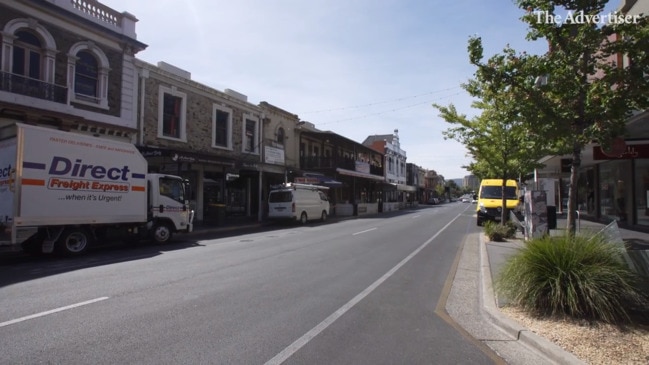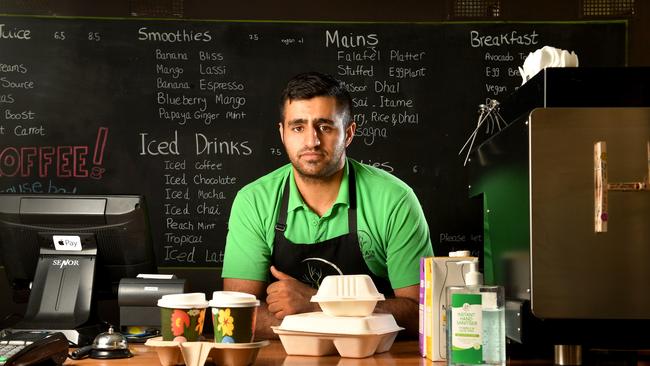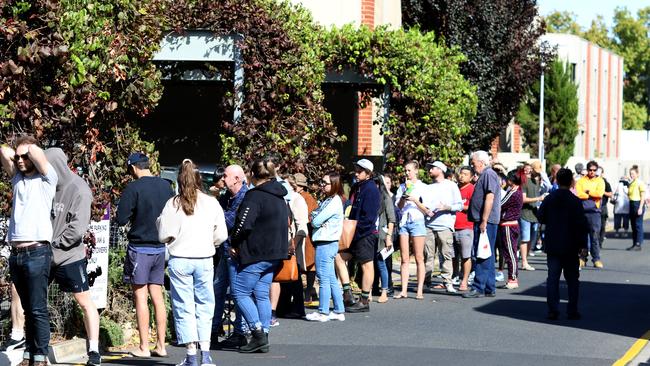Anti-virus shutdown measures leave tens of thousands of South Australians out of jobs in hospitality
Adelaide chefs and restaurateurs described the new anti-virus measures as a “hospitality apocalypse”, meanwhile Centrelink queues exploded and the MyGov website crashed under the weight of thousands suddenly unemployed.

SA News
Don't miss out on the headlines from SA News. Followed categories will be added to My News.
- More coronavirus coverage from Monday
- Strict new measures turn city into ghost town
- Your guide to Adelaide businesses adapting to stay open
Tens of thousands of South Australians have been left jobless by a decision to shut pubs, clubs and restaurants amid the coronavirus crisis, sparking calls for the community to rally behind those suddenly unemployed and battling businesses.
Thousands of people queued outside Centrelink branches around the nation and South Australia on Monday, while the MyGov website crashed with more than 95,000 people trying to apply for income support.
Adelaide chefs and restaurateurs described the overnight shutdown as a “hospitality apocalypse”, while SA’s peak industry body called for immediate relief – including a suspension of payroll tax, gaming tax and liquor licencing fees – for businesses to survive the next six months.

Arian Razaei, who owns Ayla’s cafe on Bent St, city, will trial a takeaway only service from today. “As small business owners, we just need everyone’s support,” he said.
“For at least six months, the hospitality industry is really going to struggle. We are really going to need help from the community to keep us up and running. We all need that.”
Some cafes and pubs had already shut their doors after a ban on indoor gatherings of more than 100 people, while others expected at least another week of trade.
An estimated 58,000 to 60,000 people are employed in SA’s hospitality sector, including about 38,200 in cafes, restaurants and takeaway outlets, 1700 in clubs, 13,100 in pubs, taverns and bars, 700 in food and beverage services, and 4700 in gyms and other sporting facilities.
And three times as many jobs could be affected as the hospitality shutdown sends shockwaves through supply chain businesses, economists predict.

As federal MPs rushed $83.7 billion worth of stimulus and support measures through parliament, Prime Minister Scott Morrison described the scale of the looming economic crisis as similar to the Great Depression.
“We are a strong nation and a strong people but in the months ahead this will put us all to the test like at no time since the Second World War,” he said.
“We summon the spirit of the Anzacs, of our Great Depression generation, of those who built the Snowy, of those who won the great peace of the Second World War and defended Australia. That is our legacy that we draw on.”
Mr Morrison and state leaders will consider Stage Two lockdown measures tonight, as well as their official advice for businesses on workforce planning, supply chain issues and rental relief for tenants.
Premier Steven Marshall will unveil a second stimulus package within a week.
Adelaide City Council offered a $4m support package on Monday night.
Sali Sasi, who co-owns six-month-old restaurant Leigh Street Wine Room with her husband and head chef, Nathan, welcomed the formal closure of venues.
It followed an impromptu meeting she called with Mr Marshall and industry leaders at the Wine Room on Saturday. “At least now, this allows us to not continue to haemorrhaging by staying open,” she said.
Duncan Welgemoed of Africola described the situation as a “hospitality apocalypse”, and said the next step was to forge ahead with “cooking a banging takeaway menu”.
“If these restrictions are in place for six months ... show me one single restaurant, bar, club or cafe operator that would carry that kind of debt for six months to try and then open in a depression. No one would.
“Twenty of us had to let go 759 employees on Saturday. That’s just in the CBD.”
Australian Hotels Association SA boss Ian Horne said casual workers were the “first casualties” but thousands of South Australians would be out of work until the shutdown ended.
Some venues asked staff to take leave, while others considered stand-downs to preserve staff entitlements but allow them to seek Centrelink support.
“Nobody could ever contemplate a set of circumstances where every single hotel in Australia was shut down on the same day,” Mr Horne said.
He called for direct wage subsidies for staff, following the UK's model, and land tax concessions for landlords who could then suspend rents for businesses, as well as an immediate holiday on payroll tax, gaming tax and liquor licencing fees. State Labor has already flagged it will back waiving a raft of taxes.

Opposition Leader Peter Malinauskas called for a taskforce to tackle any further issues, which would include the Premier, himself, industry representatives, the AHA, and unions.
SA Centre for Economic Studies director Michael O'Neil said three times as many jobs could be hit as the supply chains felt the knock on impacts. He predicted the shutdown could drastically alter business models, and cause the gambling industry to “collapse” because people couldn't get into a venue. Business SA's Martin Haese said thousands of workers would be impacted but backed the venue closures, saying: “Government has made it crystal clear that these measures will save lives.”
“If there’s ever a time to support SA businesses, it’s now,” Mr Haese said.
After the MyGov site collapsed following the announcement of new welfare payments on Monday, Federal Government Services Minister Stuart Robert clarified there had been no cyber attack, just an overwhelming number of legitimate users.
He said the Government was looking at how to expand its current capacity of 55,000 simultaneous users.
Meanwhile, Australia is also withdrawing its non-essential troops from Iraq and Afghanistan in the wake of the virus crisis.
Additional reporting
Giuseppe Tauriello,
Andrew Hough
